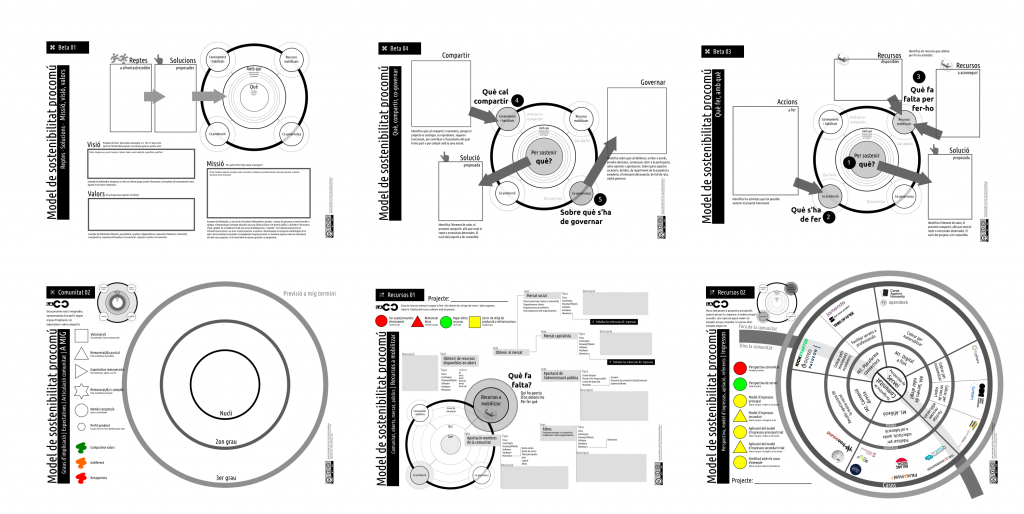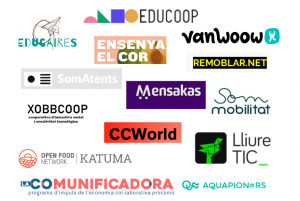This post is also available in: Español (Spanish) English
Des de fa unes setmanes està en marxa la 4a edició del programa de La Comunificadora, de Barcelona Activa, que coordinem conjuntament amb la cooperativa LabCoop.
E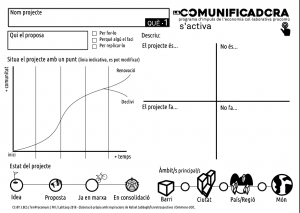 s van escollir 12 projectes, dels quals, 9 estan participant en el programa: Favors, SADESS, REX, La Masovera, Nala, DADESS, Revolt5G, DogCaring i Holiday Exchange. Gairebé tots havien passat per una fase prèvia de quatre sessions «La Comunificadora s’activa», al desembre i al gener, que van servir per explicar el programa, identificar reptes i oportunitats, alhora que acompanyar i definir els projectes perquè poguessin preparar les seves candidatures i entressin al programa, amb el focus posat al procomú.
s van escollir 12 projectes, dels quals, 9 estan participant en el programa: Favors, SADESS, REX, La Masovera, Nala, DADESS, Revolt5G, DogCaring i Holiday Exchange. Gairebé tots havien passat per una fase prèvia de quatre sessions «La Comunificadora s’activa», al desembre i al gener, que van servir per explicar el programa, identificar reptes i oportunitats, alhora que acompanyar i definir els projectes perquè poguessin preparar les seves candidatures i entressin al programa, amb el focus posat al procomú.
Els projectes participants, cada un dels quals compta amb el suport d’una persona tutora del programa, giren entorn temàtiques i propòsits molt diferents, des de projectes de banc de temps, fins a intercanvi de casa, cures per a la gent gran, mobilitat sostenible, cura col·lectiva de gossos, combatre el ciber-assetjament masclista, habitatge sostenible o ràdios comunitàries.
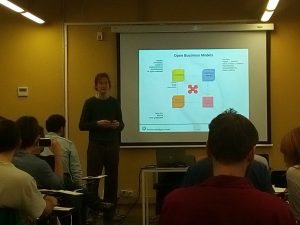
Aquests projectes segueixen un itinerari de 3 mesos (26 sessions), al llarg de les quals s’utilitza com a fil conductor el Model dels 5 pilars de sostenibilitat del procomú, un model utilitzat des de la primera edició del programa
Hem identificat que en els models sostenibles existeix un fràgil equilibri entre les motivacions dels diferents participants: el repte sembla residir en la maximització de la motivació d’un grup suficientment gran i divers de persones que contribueixen (en el model de producció p2p) a parts importants del projecte, compartint visió, missió i valors, i amb una política alineada de compartir el coneixement i la governança.
La Comunificadora doncs, se centra en el procomú en oposició a les economies extractives, projectes, moltes vegades empreses StartUp, que no tenen un model de negoci sinó que sovint se sostenen a través de rondes de finançament, d’inversors de risc (business angels) i/o gegants oligopolístics, i que no són sostenibles, ni econòmicament ni pel medi ambient, mentre posen en risc els drets socials. No es busca replicar-les fent-ne alternatives del mercat social, perquè no són replicables i mirar de fer-ho porta directament al fracàs. El que es busca doncs és trobar models alternatius per afrontar els reptes identificats.
Durant aquests tres mesos, els projectes participants fan tres iteracions pels 5 pilars del procomú.
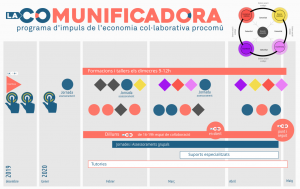 La primera, en una sessió de tres hores, la «Iteració Beta», en què ràpidament cada un dels projectes reflexiona i imagina com configurarà cada un dels pilars.
La primera, en una sessió de tres hores, la «Iteració Beta», en què ràpidament cada un dels projectes reflexiona i imagina com configurarà cada un dels pilars.
Les següents 5 sessions de formació, serveixen per fer una segona iteració, per aprofundir i ampliar els coneixements en cada un dels 5 pilars, amb Llenços de l’itinerari dels 5 pilars del procomú dissenyats específicament amb aquest propòsit, i que podeu descarregar aquí.
• Pilar central, on es troba el Recurs Procomú. Identifica l’element de valor, el procomú compartit, allò que resol el repte o les necessitats detectades, el nucli del projecte a fer sostenible, amb la Missió, Visió i Valors, ben definits, i la comunitat (el grup de persones que gestionen i treuen profit del procomú).
• Pilar de recursos a mobilitzar, ingressos i contribucions. Identifica els recursos que caldran per fer les activitats que requereix el projecte. Amb una anàlisi de models de sostenibilitat de projectes, que existeixen i se sostenen des de fa anys, i que es troben en el marc de l’Economia Social i Solidària en la intersecció del procomú i el mercat social, entre una perspectiva de comunitat i perspectiva de servei.
• Pilar de co-producció. Identifica les activitats que fan possible sostenir el projecte funcionant, qui les fa, com s’organitza la producció i com es compensa.
• Pilar de governança. Identifica sobre què cal deliberar, arribar a acords, prendre decisions, consensuar, obrir a la participació, rebre opinions o aportacions. Sobre quins aspectes societaris, de béns, de repartiment de la propietat, o excedents, d’orientació del projecte, de full de ruta, caldrà governar.
• Pilar de compartir coneixement. Identifica què cal compartir, transmetre, perquè el projecte se sostingui, es reprodueixi, segueixi funcionant, per contribuir a l’ecosistema del qual forma part o per complir amb la seva missió.
En les últimes 5 sessions, la tercera iteració pels 5 pilars, deixarà els projectes preparats, amb un full de ruta a seguir cap a esdevenir sostenibles i autònoms.
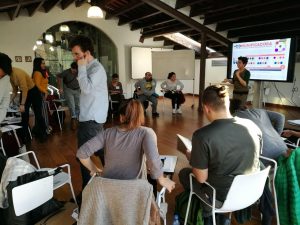 Mentrestant, en les sessions de treball col·laboratiu, estem tractant les habilitats i competències de les persones participants, compartint aprenentatges, promovent i practicant la intercooperacio entre projectes, amb microformacions creuades i altres activitats grupals.
Mentrestant, en les sessions de treball col·laboratiu, estem tractant les habilitats i competències de les persones participants, compartint aprenentatges, promovent i practicant la intercooperacio entre projectes, amb microformacions creuades i altres activitats grupals.
El programa ja ha fet la 1a Jornada d’Assessores, està a punt de fer el primer de 4 Assessoraments grupals, oferirà 5 hores de suport especialitzat a cada un dels projectes, i comptarà amb dues jornades obertes, per rebre les aportacions de tothom qui hi estigui interessat. Ja us podeu apuntar a l’agenda la Sessió Oberta de LaCo:• dilluns 30 de març de 4 a 7 de la tarda.
Com cada edició, La Comunificadora, utilitza La Teixidora per documentar-se: 1a edició 2016 · 2a edició 2017 · 3a edició 2018-19 · 4a edició 2020 Hi publiquem els materials de cada sessió, les presentacions amb els continguts formatius, els apunts presos per participants i formadores, els llenços que hi treballem i imatges de la sessió.
Enguany, per 3er any, també ferm servir Loomio com a eina a través de la qual comunicar-nos en el temps que passa entre sessió i sessió, per intercanviar informació, dubtes, preguntes, etc. I l’oficina de CommonsCloud, on guardem els documents de treball de cada un dels projectes compartits amb les persones tutores i els altres projectes.
L’any 2016 una de les propostes de la trobada «Economies col·laboratives procomuns» va ser crear mecanismes de suport i incubació per enfortir l’ecosistema procomú metropolità. Aquesta proposta va rebre el suport ciutadà al procés participatiu del Pla d’Acció Municipal al Decidim i Barcelona Activa va entomar-ho creant el programa La Comunificadora. Ja són 4 edicions i el col·lectiu de persones que hi han participat s’ha anat fent gran, mentre que les metodologies i format del programa ha anat evolucionant a partir de l’avaluació de l’experiència de cada edició. Molts projectes i persones que han passat pel programa formen part d’un ecosistema d’economia col·laborativa que s’articula en aquesta intersecció entre models procomuns, models d’intercooperació i de mercat social.

